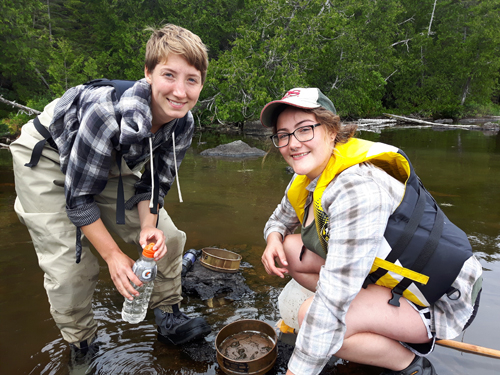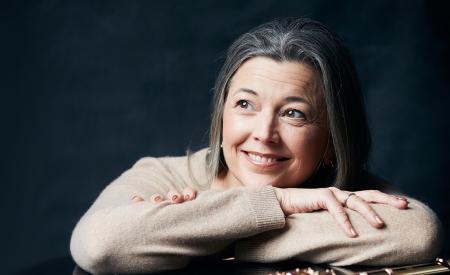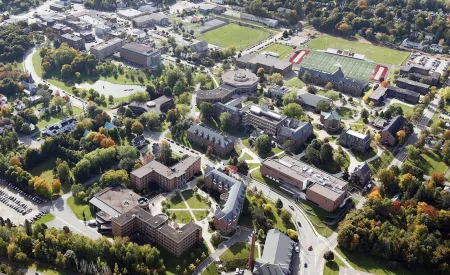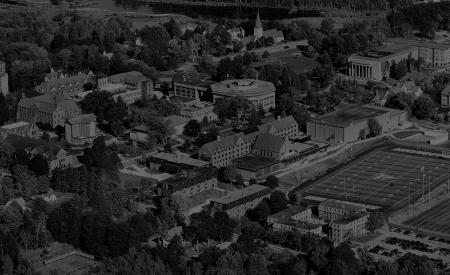5Q: Caeleigh Marshall, Honours Environmental Science
 1. You received an independent student summer research grant to do your honours research. What did you research for your project?
1. You received an independent student summer research grant to do your honours research. What did you research for your project?
My project looks at zooplankton that are in the shallow or littoral waters of lakes in New Brunswick. The idea is to better understand the habitat of these littoral species. This is because we see, from my supervisor Dr. Joshua Kurek’s and other paleoliminologist’s work on the sediment records, littoral species are in decline and we don’t know that much about their ecology. Are they losing habitat or is it some other factor causing their decline?
As part of the research, we go to these lakes and survey them with a canoe, which is great. I love it. This gives a general idea of the types of littoral habitat that the zooplankton may be attracted to. Then we sample those different areas. We are hoping to find patterns with different species that thrive better under different conditions. Another component of this project is looking at more acidified lakes in the southwestern part of the province. We will likely find different habitats there.
2. Why is this research important?
These guys are a crucial intermediate stage in the food web. We are looking at cladocera, which are mainly eating phytoplankton and young fish and invertebrates in turn eat them.
So understanding species shifts and shifts in the community is important because of what is happening with climate change and acidification. We need to understand what changes are going to happen. From there, other scientists may be able to predict the effect on other species. Perhaps it will be harder for fish to forage or perhaps easier.
3. Why did you decide to come to Mount Allison?
I was looking for a smaller school. I had family that went to larger schools but they found them a bit alienating. They wished they had been in a smaller community.
I also wanted to branch out a bit more and I had never been to the Maritimes (I’m from Harriston, Ontario). I had heard lots of good things about Mount A, including from my chemistry teacher in high school who went here and loved it. So my Mom and I checked it out at an open house and it seemed like a good fit. I am glad I came here.
4. What extracurricular activities do you do?
I am an environmental science nerd. I am on EcoAction, which is environmental group that meets to discuss environmental issues and looks for ways to lessen the environmental impact on campus and in the community. I also help run Lettuce Eat, a food security/education/meal program that offers free nutritious meals to the community. We are hoping to do it more frequently this year, from once a month to biweekly. We are also hoping to get some younger members involved as a lot of us are graduating and we want to keep it going. Finally, I love to play soccer in the summer just for fun.
5. Why did you choose environmental science?
At first I was not sure so I took a year off after high school as all my friends seemed to know what they wanted to do and I didn’t. I was always interested in environmental issues and my Mom has been a big influence in that regard. Also, part of the reason I decided to do environmental science is I love to be outside doing hands-on work and I have been able to do that.
I am really glad I chose ES. Everyone I have worked with has been really great; it is a really great community. I have been able to work with Dr. Kurek, so I study freshwater and I think it is so important, for as climate change progresses freshwater is going to be a lot scarcer. That is one thing in environmental science; you learn a lot of things that are very upsetting. However, there are a lot of really smart people around the world working on these issues and I want to be part of that community.
Bonus question: What do you think you will do when you graduate?
I plan to take a year off and work and travel or just work or just travel. I want to try out some different things. I might go on and do a master’s degree. I have been enjoying the research so far. It is real experiential learning and one thing I learned is that I love being out in the field. It is beautiful and you get to spend all day out in a canoe. It is pretty great but I will see how I find the lab work, which is going to be pretty substantial.




